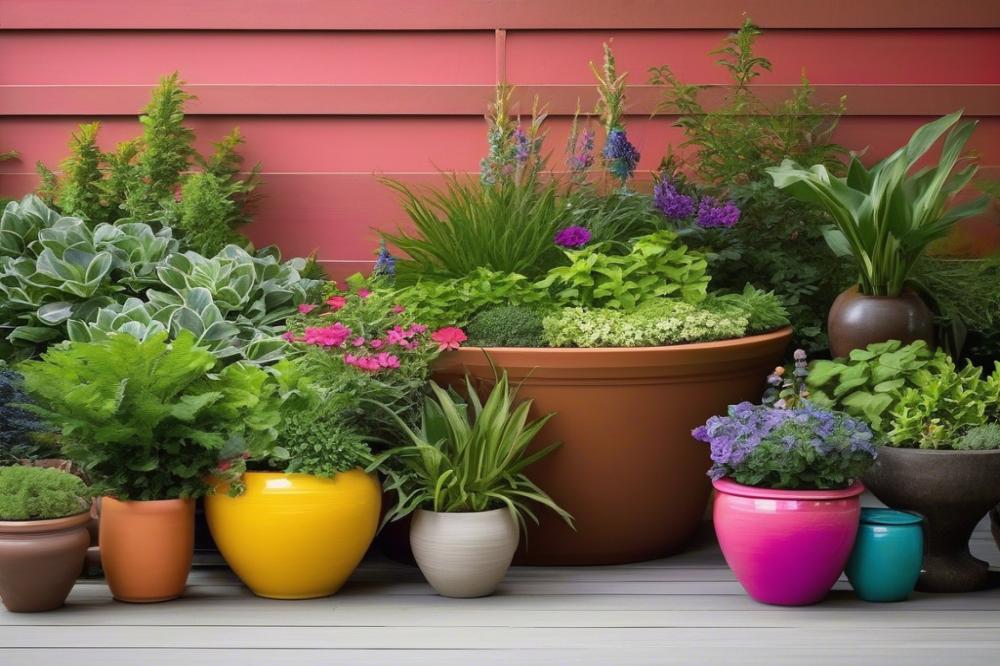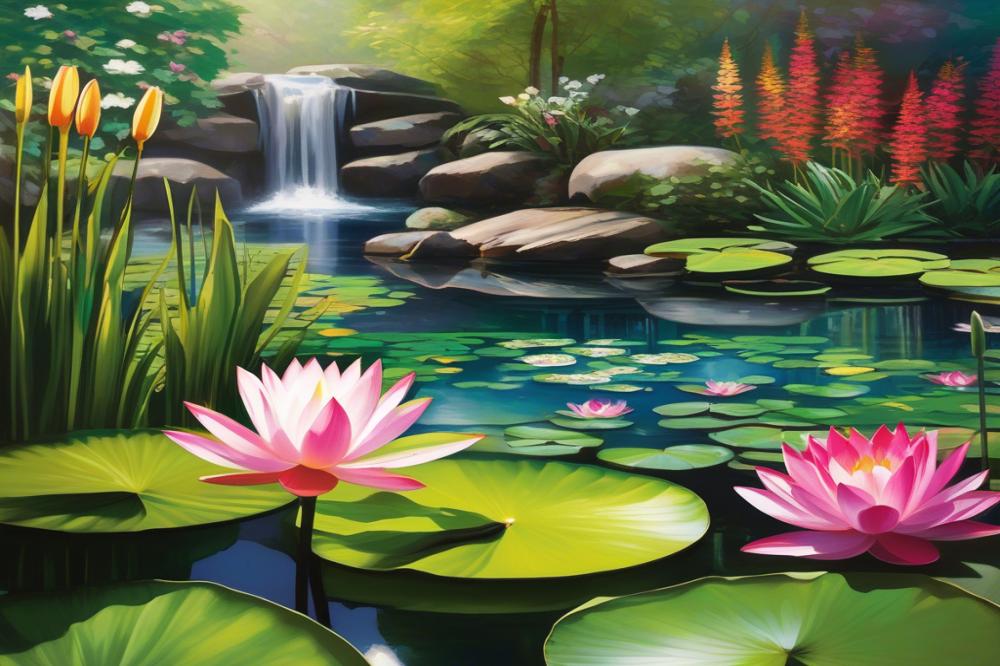Introduction
Container gardening has become increasingly popular among urban dwellers and gardening enthusiasts alike. This approach allows individuals to cultivate plants in limited spaces such as balconies, patios, and small yards. However, successful container gardening hinges on one crucial factor: selecting the right fertilizers. With the soil in containers often depleted of nutrients, it’s essential to provide plants with the necessary elements to thrive.
A fertilizer is a plant food, offering essential nutrients that plants need for growth. Nutrients for potted plants are critical for achieving healthy and robust growth. Unlike traditional gardens, containers usually lack a natural ecosystem. Thus, gardeners must actively replenish nutrients. organic fertilizers, for example, can be a great choice for those seeking natural solutions. These fertilizers enhance soil quality and improve plant health over time.
Many gardeners opt for slow-release fertilizers to simplify the feeding process. These fertilizers release nutrients gradually, ensuring that plants receive a steady supply over time. Liquid fertilizers, on the other hand, offer quick results. This type can be mixed with water and applied directly to the soil or even used as a foliar feed. Each method has its advantages, so choice often depends on plant type and gardening style.
The best fertilizers for pots tend to be comprehensive, catering to various plants’ needs. Compost is another valuable supplement, providing both nutrients and organic matter. It improves soil structure and enhances moisture retention. Gardeners should keep in mind that different plants have varying requirements. For example, a fertilizer for herbs might contain higher nitrogen levels to promote leafy growth, whereas flowering plants may need more phosphorus.
Ultimately, the success of container gardening rests on understanding these critical components. By carefully selecting the appropriate fertilizers, gardeners can optimize their plant health and ensure vibrant growth. Knowing which products to use can make a significant difference in achieving a flourishing container garden.
Understanding container gardening fertilizers
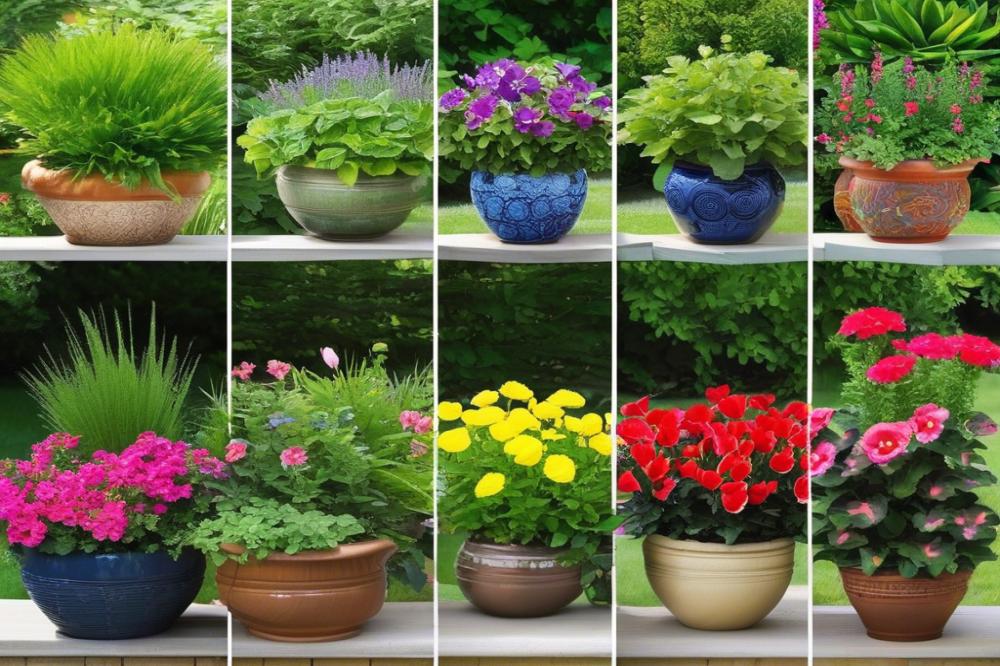

Container gardening involves growing plants in pots instead of traditional garden beds. This method can be rewarding, but it requires special attention to nutrient needs. With limited soil volume, plants in containers sometimes struggle to get the nutrients they require. Using the right fertilizers can make a significant difference in their growth and health.
Several types of fertilizers are appropriate for container gardens. organic fertilizers, for example, come from natural sources. These can include compost or well-rotted manure. Natural fertilizers are gentle and improve soil structure over time, providing a slow supply of nutrients. slow-release fertilizers also fall into this category. They gradually provide nutrients over weeks or months, which helps keep plants fed without frequent applications.
Another popular option is liquid fertilizers. These formulas dissolve easily in water and can be applied directly to the soil or as foliar feed. Such applications are beneficial when plants show signs of nutrient deficiency or need a quick boost. They deliver nutrients directly to the roots or leaves, facilitating rapid absorption. For instance, fertilizer for herbs often comes in a liquid form, allowing for easy feeding during the growing season.
All-purpose fertilizers cater to various plant types, making them versatile. These products contain an even mix of nutrients, ensuring a balanced diet for your potted plants. It’s important to follow the recommended usage on the label, as over-fertilizing can harm the plants.
Compost serves dual purposes in container gardening. Not only does it enrich the soil, but it also retains moisture. This can be particularly valuable during hot weather. By adding compost, you create a nurturing environment for roots and soil microbes alike. Nutrients from compost release slowly, providing ongoing nourishment.
Lastly, specialized plant food products exist for particular types of plants. Some are specially formulated for flowering plants, while others focus on leafy greens. Tailoring the fertilizer choice based on plant type meets their unique needs, helping them thrive.
Organic Fertilizers for Container Gardens
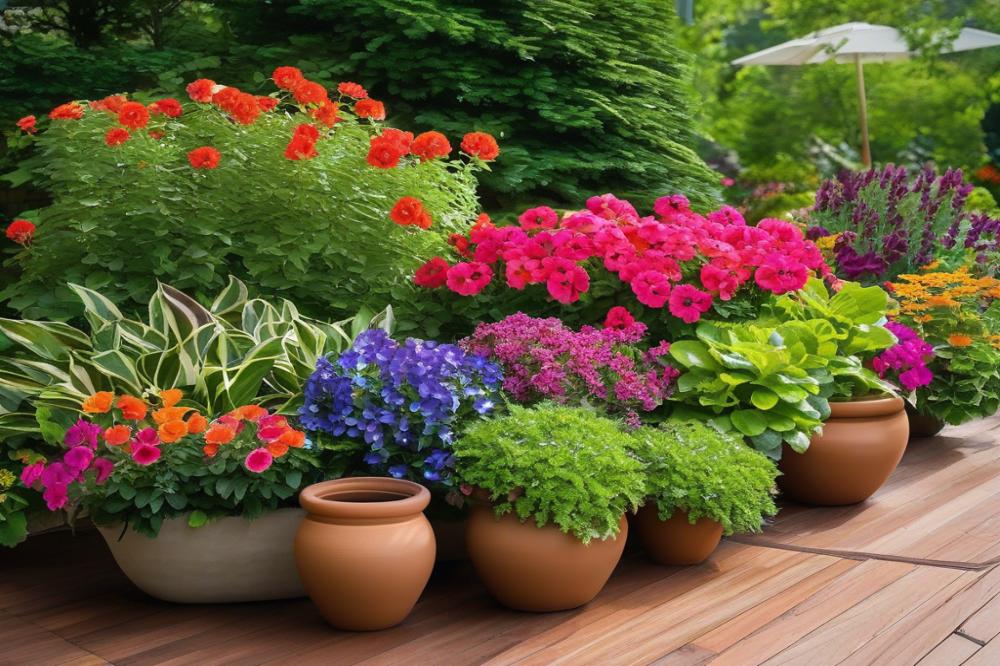

Container gardening has grown in popularity, and using organic fertilizers can elevate your experience. Many gardeners appreciate the benefits of organic options. These fertilizers are derived from natural sources and can improve soil health while being safe for the environment. They promote sustainable practices and offer numerous advantages over chemical alternatives.
One popular choice is compost. Rich in nutrients, compost is created from decomposed organic matter. It enhances soil structure and encourages beneficial microorganisms. Making your own compost can be rewarding and adds a unique touch to your gardening. Adding this to your containers boosts nutrients for potted plants.
Natural fertilizers are another excellent option. These include materials like bone meal, fish emulsion, and cottonseed meal. Each of these provides different nutrients. Fish emulsion acts as a rapid growth stimulant, supplying essential nitrogen. Also, you can find many all-purpose fertilizers that come from these natural sources, making them versatile for various plants.
When it comes to feeding your plants, timing is crucial. Slow-release fertilizers give a gradual supply of nutrients over time. This approach helps maintain consistent growth without overwhelming the plants. Gardeners often prefer incorporating them into the soil mix at the beginning. Liquid fertilizers can also be mixed with water for quick absorption, often used as a foliar feed.
Don’t forget about plant food specifically designed for herbs if you’re growing them in pots. Fertilizer for herbs usually has a balanced composition, promoting lively growth and rich flavors. Regular feeding during the growing season can yield vibrant and aromatic herbs.
Incorporating organic fertilizers into container gardening can be straightforward. Start with soil rich in organic matter, then add compost or a natural fertilizer according to the plants’ needs. Adjusting the frequency of feedings according to specific growth stages can significantly impact your garden’s success.
Slow-Release Fertilizers
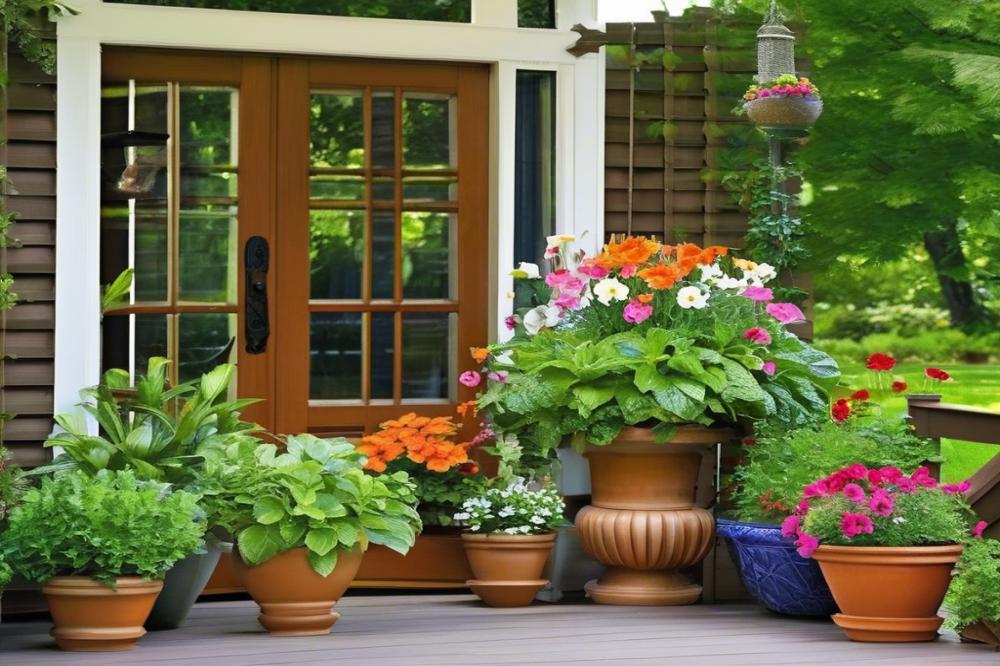

Slow-release fertilizers offer a steady supply of nutrients for potted plants over time. These fertilizers are designed to gradually break down, releasing nutrients at a controlled rate. This method helps to prevent nutrient leaching and minimizes the risk of over-fertilization, which can harm delicate roots.
One significant advantage of using slow-release fertilizers is convenience. Gardeners don’t need to apply them as frequently as other types. They typically only need to be applied every few months. This is a huge benefit for those who might forget to fertilize regularly. Another perk is that they work well with various planting mediums, including compost and other organic fertilizers.
When looking for specific products, consider brands that focus on all-purpose formulations. For example, Osmocote Plus is a popular choice among gardeners. This slow-release plant food contains essential nutrients for a broad range of plants. Additionally, brands like Miracle-Gro also offer effective slow-release options that cater to herbs and flowering plants.
Moreover, some natural fertilizers, such as those derived from fish or bone meal, provide slow-release benefits. These organic options can enrich the soil while ensuring that plants receive a balanced diet. Liquid fertilizers can also be effective, but their application must be more frequent, making them less convenient for busy gardeners.
To maximize results, consider using slow-release fertilizers alongside foliar feed. Combining these methods can ensure that your plants receive nutrients in multiple ways. With careful selection and application, you can provide a nurturing environment for your container garden.
Liquid Fertilizers and Foliar Feed
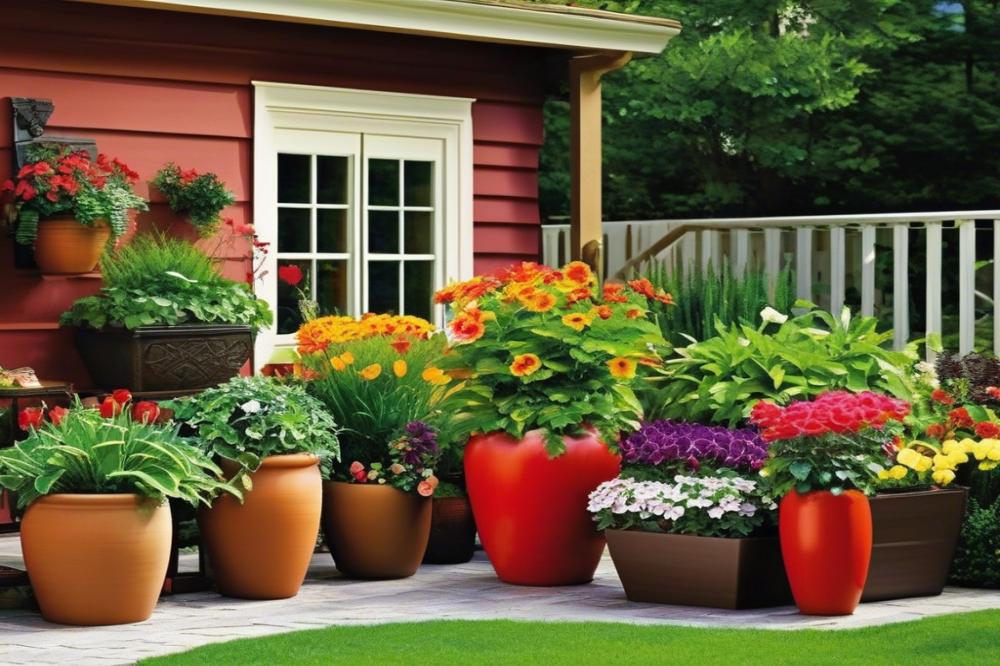

Liquid fertilizers offer a convenient and effective way to provide nutrients to container plants. These products dissolve quickly in water, making it easy to deliver essential nutrients directly to the roots. Applying liquid fertilizers can also allow better control over the amount of nutrients given, enabling gardeners to tailor the feeding regimen to plant needs.
Foliar feeding is another beneficial method. This technique involves spraying a diluted nutrient solution directly onto the leaves. When plants absorb nutrients through their foliage, they often respond rapidly. Foliar feed can help address deficiencies and support healthier growth in a short time. Container plants, with their limited soil volume, particularly benefit from this approach.
When selecting liquid fertilizers, consider the type of plants you’re growing. For herbs, an all-purpose fertilizer or specific fertilizer for herbs can deliver balanced nutrients. Organic fertilizers are excellent options because they provide natural food that encourages healthy growth without the risk of burn. If you’re looking for something steady, slow-release fertilizers also work well in conjunction but require a different method of application.
Compost tea is another great choice for potted plants. This homemade concoction, made from steeping compost in water, enriches plants with a variety of nutrients. Using it as a foliar feed can enhance nutrient uptake and improve overall plant health. Many gardeners find success using natural fertilizers that align with their eco-friendly priorities.
For those who want quick results, liquid plant food can be mixed into watering cans for routine feeding. Recommended brands vary, but finding a nutrient-rich option that suits your growing situation is important. Liquid fertilizers typically optimize plant development and improve yield.
Always adjust the application rate according to the specific needs of the plants in your containers. Monitoring your plants regularly helps you know when they require more nutrients or when to cut back. By choosing the right liquid fertilizers and incorporating foliar feeding into your routine, you can foster robust growth in your container garden.
All-Purpose Fertilizers and Plant Food
All-purpose fertilizers are versatile options for container gardening. They provide a balanced mix of essential nutrients, making them suitable for a variety of plants. Since container plants have limited space for nutrients, using an all-purpose fertilizer can help keep them healthy and thriving. These products usually contain nitrogen, phosphorus, and potassium, essential for growth.
In comparison, specialized plant food targets specific needs of particular plants. For example, fertilizers designed for herbs may contain higher nitrogen levels. Gardeners often choose these specialized options when they need to address unique challenges. However, all-purpose fertilizers can simplify the process, especially for beginners.
Selecting the Right Plant Food
When choosing plant food, consider the type of plants you are growing. Some may thrive with organic fertilizers, while others prefer synthetic options. It’s crucial to assess the specific needs of your plants. If you’re growing vegetables, look for slow-release fertilizers. These can nourish your plants over an extended period. Liquid fertilizers can also be effective, especially when used as a foliar feed.
Compost can be an excellent addition to potting mix, providing natural nutrients for potted plants. Mixing compost with all-purpose fertilizer can boost plant health and soil quality. Moreover, those growing flowering plants might need a fertilizer with more phosphorus to encourage blooms.
Additionally, consider your watering habits. If you frequently water your plants, they might require more consistent feeding. A fertilizer for herbs that dissolves in water may be a good choice for applications throughout the growing season. Always read the instructions carefully to avoid over-fertilizing, which can harm your plants.
Nutrients for Potted Plants
Plants in containers need essential nutrients to thrive. The three primary nutrients include nitrogen, phosphorus, and potassium. Nitrogen promotes healthy leaf growth, which is vital for plants like lettuce and kale. Phosphorus supports root development and flowering, crucial for fruit-bearing plants. Lastly, potassium aids in overall plant health and improves resistance to diseases.
Balancing these nutrients in container gardening is essential for plant success. Many gardeners choose organic fertilizers due to their natural ingredients, which can nurture plants without harsh chemicals. Some people prefer slow-release fertilizers that gradually supply nutrients over time. This method keeps plants healthy without the risk of burning roots.
Testing soil nutrients is a wise practice. Various kits are available to measure the nutrient levels in your potting mix. After testing, you can amend the soil accordingly. If nitrogen is deficient, consider applying plant food high in nitrogen content. When phosphorus is low, bone meal or rock phosphate can help boost levels. Potassium levels can be raised with natural fertilizers like kelp meal.
Liquid fertilizers offer another option for quick nutrient delivery. They are often used as a foliar feed, allowing plants to absorb nutrients directly through their leaves. This method is especially beneficial for fast-growing herbs, which thrive on consistent feeding.
It’s vital to select an all-purpose fertilizer suitable for container gardening. Many products combine necessary nutrients in a balanced way. Following the application instructions on the label can yield the best results. Regularly checking your plants’ progress will guide your fertilizing schedule. Observing your plants for signs of deficiency or excess can provide insight into their needs.
In summary, understanding the basic nutrients for potted plants is key. Tailoring your approach with various fertilizers can significantly impact growth and yield. Always keep an eye on how your plants respond to the nutrients and adjust your methods as needed.
Wrapping Up Your Fertilizer Choices
In summary, selecting the right fertilizer for your container garden is crucial. There are various options available, from synthetic solutions to organic fertilizers. Each type serves a distinct purpose, fitting different plants and gardening styles. It is vital to consider the specific needs of your plants. Different species require different nutrients. For example, flowering plants often benefit from fertilizers that promote blooms, while leafy greens might thrive on those rich in nitrogen.
Gardeners should also think about their own preferences. Do you want something that works quickly, or are you looking for slow-release fertilizers that provide nutrients over time? Many choose slow-release options for convenience, allowing them to focus on other aspects of their gardening without constant concern.
Regular fertilization plays a significant role in maintaining healthy container gardens. Nutrients can deplete rapidly in confined spaces, often leading to poor plant health if not addressed. Therefore, staying on top of your gardening routine can yield spectacular results. Ultimately, a bit of planning can go a long way. Prioritize the needs of your plants, and you will see a thriving container garden that brings you joy all season long.

